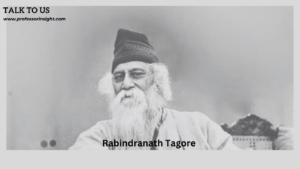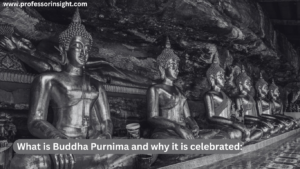Rabindranath Tagore, also known as Gurudev, Rabindranath Tagore was born on May 7, 1861, and this day is celebrated as Rabindranath Tagore Jayanti. This year, the country will celebrate the 163rd birth anniversary of the noble laureate. He was a great Bengali poet, writer, philosopher, novelist and much more. he was a Bengali polymath, who had knowledge of several subjects. he also made notable contributions to literature as a dramatist, novelist, short story writer, and writer of nonfictional prose, especially essays, criticism, philosophical treatises, journals, memoirs, and letters. A man of prodigious literary and artistic accomplishments, Tagore played a leading role in Indian cultural renaissance and came to be recognized, along with Mohandas Gandhi, as one of the architects of modern India. India’s first Prime Minister, Jawaharlal Nehru, wrote in Discovery of India, “Tagore and Gandhi have undoubtedly been the two outstanding and dominating figures in the first half of the twentieth century. His influence extends far beyond his native country, earning him a revered place in the global cultural landscape. Let us delve into the life and legacy of this remarkable figure:

Rabindranath Tagore’s Education and life style:
His father, Debendranath Tagore, was a philosopher and religious reformer, while his mother, Sarada Devi, was a devout housewife. Rabindranath was the youngest of thirteen children, and he lost his mother at a tender age. Rabindranath Tagore early began to write verses, and, after incomplete studies in England in the late 1870s, he returned to India. There he published several books of poetry in the 1880s and completed MANASI (1890), a collection that marks the maturing of his genius. It contains some of his best-known poems, including many in verse forms new to Benali as well as some social and political satire that was critical of his fellow Bengalis. Tagore’s education began at home under private tutors. He was a precocious child and showed a deep interest in literature, music, and the arts from an early age. He also received a formal education in various subjects, including Sanskrit, English, mathematics, and history. Tagore’s literary journey began with poetry. His first collection of poems, “Kabi Kahini” (The Poet’s Tale), was published when he was just sixteen. Over the years, he wrote prolifically in Bengali and eventually became the first non-European to win the Nobel Prize in Literature in 1913 for his work “Gitanjali” (Song Offerings). Indian National Movement, protesting the political and cultural dominance of the West. Members of the Tagore family had actively participated in all the three movements, and Tagore’s own work, in a broad sense, represented the culmination of this three-pronged revolution. Tagore was a visionary educator and founded the Visva-Bharati University in Santiniketan, West Bengal, in 1921. Inspired by his philosophy of holistic education, Visva-Bharati aimed to foster a harmonious blend of Eastern and Western learning traditions, emphasizing creativity, critical thinking, and a deep connection with nature. Tagore dictated his last poem a few hours before his death on August 7, 1941. The leading newspapers of the world published editorials paying tribute to him as India’s greatest man of letters, The soul of Bengal, and ambassador of friendship between East and West. WE honor his contributions to literature, music, education, and social change, and we continue to draw inspiration from his timeless wisdom and artistic genius.
Rabindranath Tagore’s Legacy: The power of creativity,
Rabindranath Tagore‘s life and work exemplify the power of creativity, intellect, and humanism. He was a towering figure of the Indian Renaissance and remains one of the most revered cultural icons of the twentieth century. As we celebrate his we honor his contributions to literature, music, education, and social change, and we continue to draw inspiration from his timeless wisdom and artistic genius. And we should be proud on him because he taught lots of lessons for life and inspirational
Most Famous Rabindranath Tagore’s quotes:
Rabindranath Tagore’s quotes are profound, here are we discuss 5 most inspirational and life changing quotes which is literally going to change your life.
{Faith is the bird that feels the light when the dawn is still dark.}
{Every child comes with the message that God is not yet discouraged of man.}
{The highest education is that which does not merely give us information but makes our life in harmony with all existence.}
{Don’t limit a child to your own learning, for they were born in another time.}
{Love is an endless mystery, for it has nothing else to explain it.}
Also reads – Who is Anshul Kamboj: Know all about him Including IPL debut and Biography.
-
Rabindranath Tagore’s University Name?
Rabindranath Tagore’s university is called Visva-Bharati University. He founded this institution in 1921 in Santiniketan, West Bengal, India.
-
Rabindranath Tagore’s poems?
Rabindranath Tagore was a Great poet of love, nature, spirituality, humanism, and the complexities of life. Here are a few of his well-known poems:
Gitanjali (Song Offerings):
Where the Mind is Without Fear:
The Kabuliwala:
The Post Office:
The Home and the World:
And many more. -
Rabindranath Tagore’s quotes?
Most Famous Rabindranath Tagore’s quotes
“Faith is the bird that feels the light when the dawn is still dark.”
“Every child comes with the message that God is not yet discouraged of man.”
“The highest education is that which does not merely give us information but makes our life in harmony with all existence.” -
Rabindranath Tagore’s Nobel Prize?
Rabindranath Tagore was awarded the Nobel Prize in Literature in 1913 for his work Gitanjali. This collection of poems, originally written in Bengali and translated into English by Tagore himself, consists of deeply spiritual and devotional verses expressing the poet’s profound longing for divine connection.
-
Rabindranath Tagore’s Birthday?
Rabindranath Tagore was born on May 7, 1861.
-
Rabindranath Tagore’s Birth place?
Rabindranath Tagore was born in Calcutta, Bengal Presidency.
-
What language did Rabindranath Tagore write in?
Rabindranath Tagore wrote primarily in Bengali but also translated his works into English.
-
The means of Rabindranath?
“Rabindranath” “means the master of the sun” or “lord of the day” in Sanskrit.


Pingback: A Mom Who adores you a lot: Mother’s Day Special - professor insight
Pingback: What is Buddha Purnima and why it is celebrated: Vesak2024 » professor insight